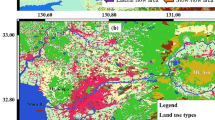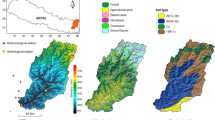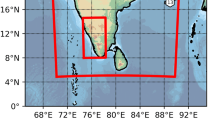Abstract
In this paper, variations of surface water flow and its climatic causes in China are analyzed using hydrological and meteorological observational data, as well as the impact data set (version 2.0) published by the National Climate Center in November 2009. The results indicate that surface water resources showed an increasing trend in the source region of the Yangtze River over the past 51 years, especially after 2004. The trend was very clearly shown, and there were quasi-periods of 9 years and 22 years, where the Tibetan Plateau heating field enhanced the effect, and the plateau monsoon entered a strong period. Precipitation notably increased, and glacier melt water increased due to climate change, all of which are the main climatic causes for increases in water resources in the source region. Based on global climate model prediction, in the SRESA1B climate change scenarios, water resources are likely to increase in this region for the next 20 years.
Similar content being viewed by others
References
Cao Jianting, Qin Dahe, Luo Y et al., 2007. Discharge changes of the Yangtze River in source area during 1956–2000. Advances in Water Science, 18(1): 29–33. (in Chinese)
Editorial Committee of the Eco-environment of Nature Reserves in the Three Rivers Source Region, 2002. The Eco-environment of Nature Reserves in the Three Rivers Source Region. Xining: Qinghai People’s Press, 75–91. (in Chinese)
Filippo G, Lin D, Mearns O et al., 2002. Calculation of average, uncertainty range and reliability of regional climate changes from AOGCM simulations via the ‘Reliability Ensemble Averaging (REA) ‘method. Journal of Climate, 15(10): 1141–1158.
Giorgi F, Mearns L O, 2003. Probability of regional climate change based on the reliability ensemble averaging (REA) method. Geophysical Research Letters, 30(12): 1629, doi: 10.1029/2003GL017130.
Kang Shichang, Zhang Yongjun, Qin Dahe et al., 2007. Recent temperature increase recorded in an ice core in the source region of Yangtze River. Chinese Science Bulletin, 52(4): 457–462. (in Chinese)
Liang C, Hou Xiaobo, Pan N et al., 2011. Spatial and temporal variations of precipitation and runoff in the source region of the Yangtze River. South-to-North Water Diversion and water Science & Technology, 9(1): 53–59. (in Chinese)
Li Chunhui, Zheng Xiaokang, Yang Zhifeng et al., 2009. Trends of annual natural runoff in the Yellow River Basin. Journal of Beijing Normal University (Natural Science), 45(1): 80–85. (in Chinese)
Li Dongliang, He Jinhai, Tang X et al., 2007. The relationship between the intensity of surface heating fields over the Qinghai-Xizang Plateau and ENSO cycle. Plateau Meteorology, 26(1): 39–46. (in Chinese)
Li Lin, Li Fengxia, Guo Anhong et al., 2004. Study on the climate change trend and its catastrophe over “Sanjiangyuan” region in recent 43 years. Journal of Natural Resources, 21(1): 79–85. (in Chinese)
Pei Buxiang, 1989. Calculation and Measurement of Evaporation and Evapotranspiration. Beijing: China Meteorological Press, 87–91. (in Chinese)
Qian Kaizhu, Wan Li, Wang Xusheng et al., 2012. Periodical characteristics of baseflow in the source region of the Yangtze River. Journal of Arid Land, 4(2): 113–122.
Shi Yafeng, 1995. The Impact of Climate Change on Water Resources in Northwest China. Jinan: Shandong Scientific Press, 127–141. (in Chinese)
Tang Maocang, Cheng Guodong, Lin Zhenyao, 1998. Contemporary Climatic Variations over Qinghai-Xizang Plateau and Their Influences on Environments. Guangzhou: Science and Technology Press, 132–135. (in Chinese)
Tang Qicheng, Qu Lingguang, 1992. The Utilization of Water Resources in Arid Areas of China. Beijing: Science Press, 44–80. (in Chinese)
Wang Genxu, Li Yuanshou, Wang Yibo et al., 2003. Impacts of alpine ecosystem and climate changes on surface runoff in the headwaters of the Yangtze River. Journal of Glaciology and Geocryology, 29(4): 161–168. (in Chinese)
Wang Genxu, Li Yuanshou, Wang Yibo et al., 2007. Typical alpine wetland system changes on the Qinghai-Tibet Plateau in recent 40 years. Acta Geographica Sinica, 62(5): 481–491. (in Chinese)
Wang Keli, Cheng Guodong, Ding Yongjian et al., 2006. Characteristics of water vapor transport and atmospheric circulation for precipitation over the source regions of the Yellow and Yangtze rivers. Journal of Glaciology and Geocryology, 28(2): 8–14. (in Chinese)
Xie Changwei, Ding Yongjian. Liu Shiyin et al., 2003. Comparison analysis of runoff change in the source regions of the Yangtze and Yellow rivers. Journal of Glaciology and Geocryology, 25(4): 414–422. (in Chinese)
Xie Changwei, Ding Yongjian. Liu Shiyin, 2004. Changes of weather and hydrological environment for the last 50 years in the source regions of Yangtze and Yellow rivers. Ecology and Environment, 13(4): 520–523. (in Chinese)
Yang Jianping, Ding Yongjian, Liu Shiyin et al., 2003. Glacier change and its effect on surface runoff in the source regions of the Yangtze and Yellow rivers. Journal of Natural Resources, 18(5): 595–603. (in Chinese)
Ying Xu, Xue Jiegao, Giorgi F, 2010. Upgrades to the REA method for producing probabilistic climate change projections. Climate Research, 41: 61–81.
Yu Xuan, Shen Suhui, Yang Shuyuan et al., 2008. Characteristic and forecast of runoff change in source region of Yangtze River. Water Resources and Power, 26(6): 14–16. (in Chinese)
Zhang Shifeng, Hua D, Meng Xiujing et al., 2011. Climate change and its driving effect on the runoff in the “Three-River Headwaters” region. Acta Geographica Sinica, 66(1): 13–24. (in Chinese)
Zhu Yanlong, Chen Jin, Chen Guangcai, 2011. Runoff variation and its impacting factors in the headwaters of the Yangtze River in recent 32 years. Journal of Yangtze River Scientific Research Institute, 28(6): 1–4. (in Chinese)
Author information
Authors and Affiliations
Corresponding author
Additional information
Foundation: Climate Change Science Foundation, No.CCSF2010-05; No.CCSF2011-01
Author: Li Lin (1971–), Professor, specialized in climate change and its impact on water resources and environment.
Rights and permissions
About this article
Cite this article
Li, L., Shen, H., Dai, S. et al. Response of water resources to climate change and its future trend in the source region of the Yangtze River. J. Geogr. Sci. 23, 208–218 (2013). https://doi.org/10.1007/s11442-013-1004-z
Received:
Accepted:
Published:
Issue Date:
DOI: https://doi.org/10.1007/s11442-013-1004-z




